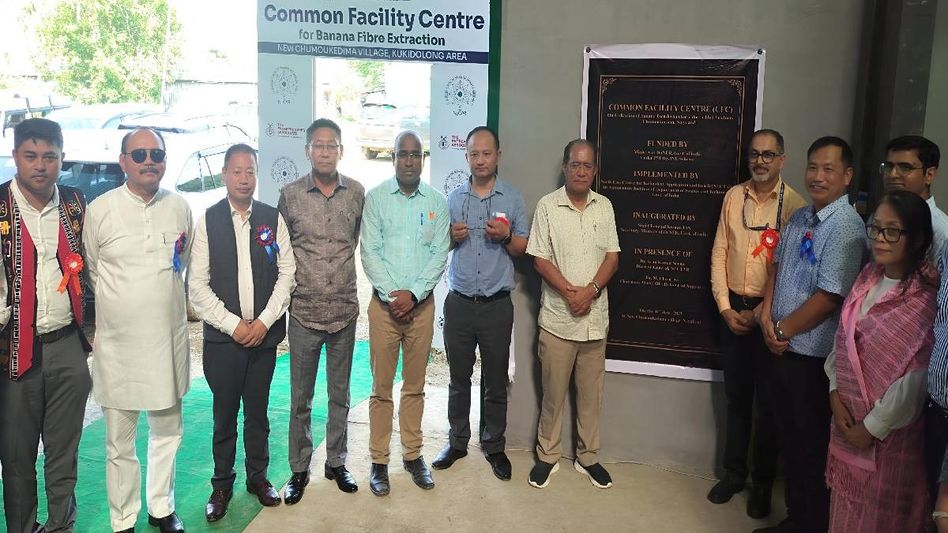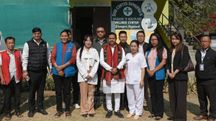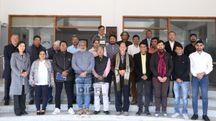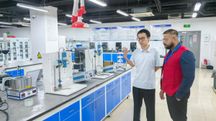NECTAR launches common facility centre in Nagaland's Chümoukedima to drive circular economy and livelihood upliftment
The North East Centre for Technology Application and Reach (NECTAR), an autonomous institute under the Department of Science and Technology, Government of India inaugurated a Common Facility Centre (CFC) at New Chümoukedima village, Chümoukedima, Nagaland.

The North East Centre for Technology Application and Reach (NECTAR), an autonomous institute under the Department of Science and Technology, Government of India inaugurated a Common Facility Centre (CFC) at New Chümoukedima village, Chümoukedima, Nagaland.
The facility has been established under the Ministry of DoNER’s PM-DevINE scheme as part of the “NECTAR Livelihood Improvement Project – A Value Chain on Utilization of Banana Pseudostem for Value-Added Products,” which aims to promote sustainable livelihoods, skill development, and value addition through the efficient utilization of agricultural waste in the entire North East India.
The event was graced by Chanchal Kumar, Secretary, Ministry of DoNER as the Chief Guest. Several other dignitaries from central and state departments, including senior officials from the Ministry of DoNER, Government of Nagaland, and representatives from developmental institutions, were also present and expressed their support for the initiative. Former minister of Nagaland, Doshehe Y Sema was also present in the event
Another key highlight of the event was the formal launch of an organic biofertilizer derived from banana pseudostem sap – a product developed under the same project to provide eco-friendly fertilizer alternatives for farming communities. This initiative not only promotes circular economy but also directly supports soil health and sustainable agriculture practices in the region.
Dr. Arun Kumar Sarma, Director General, NECTAR, delivered a detailed presentation showcasing the broader objectives of the PM-DevINE project and NECTAR’s portfolio of livelihood-oriented technological interventions across the Northeast. He highlighted how this specific project addresses a critical gap in agricultural waste management by converting banana pseudostem – typically discarded as waste into different useful and marketable products, including natural fiber, biodegradable sheets, and handmade paper. He emphasized that this model offers both environmental and economic benefits and can be replicated across other regions and crops with similar challenges.
Another important milestone marked during the ceremony was the signing of a Memorandum of
Understanding (MoU) between NECTAR and The Entrepreneurs’ Associate (tEA) based in Nagaland, formalizing their collaboration for implementation and operation of the CFC. The MoU outlines joint responsibilities for technology demonstration, community mobilization, training, and enterprise development. The Entrepreneurs' Associate is a grassroots development group with extensive local experience in fostering entrepreneurship, having helped thousands of farmers and more than 18,000 first-generation business owners in the area.
The establishment of this CFC is a step in leveraging region-specific resources and technologies to enhance rural livelihoods, entrepreneurship, and sustainable waste management. As one of twelve such centers planned under the PM-DevINE initiative, it reflects the government’s commitment to integrated development in the North Eastern Region through targeted infrastructure, innovation, and community partnerships. Another important project under the Prime Minister's Development Initiative for North East Region (PM-DevINE) scheme supported by the Ministry of Development of North Eastern Region (MDoNER) is “Promoting Scientific Organic Agriculture in NE India” which is an initiative by North East Centre for Technology Application and Reach (NECTAR).
The aim of the project is to create 250 organic certified clusters (75 in Assam, 55 in Meghalaya, 50 in Tripura, 20 in Mizoram, 20 in Nagaland, 15 in Arunachal Pradesh and 15 in Manipur) with capacity building of 250 Master Trainers and 25000 Trainee Farmers. Each cluster have a Demo Farm Lab comprises of different components such as Training Hall, Vermicompost Unit, Biofertilizer and Biopesticide room, Azolla tank, Storage room etc. Trainee farmers will prepare all the bio-inputs at Demo farm lab and utilize at their individual agricultural lands.
Based on agro-climatic conditions, organic seeds/planting materials is distributed to all the trainee farmers. There is a community seed bank in selected clusters to cater the need of organic seeds & planting material to sustain each cluster through the facilitation of training & market linkage.
NECTAR in collaboration with Bhabha Atomic Research Centre under technology transfer agreement developed a soil testing kit name “Vasundhara”. The kit will be distributed to all trainee farmers for detection of organic carbon content. A training material about the practice of crops and basic organic agriculture will be distributed to 25000 farmers.
A soil testing laboratory was inaugurated at NECTAR Shillong having facility to detect different parameters for soil testing. NECTAR has also distributed Handheld devices to all the Master Trainers to monitor the field activities. A digital platform is also created and inaugurated recently to monitor the progress where all the information related to each organic clusters such as soil data, farmers details, crop details, geographical specifications etc shall be available and functions as a database for future references to all the stake holders, Government departments and entrepreneurs. Till now, we have achieved PGS Green-I certification for 39 clusters in Assam and the remaining clusters are in progress of certification.
During this event about 100 farmers from 20 different clusters of Peren and Wokha district, Nagaland have actively participated. The program also included distribution of training materials and Vasundhara soil organic testing kits to beneficiary farmers from Nagaland. Following the unveiling of the CFC plaque and ribbon cutting, dignitaries toured the facility, observing product demonstrations and interacting with local entrepreneurs, farmers, and self-help groups engaged under the project.
Copyright©2026 Living Media India Limited. For reprint rights: Syndications Today









